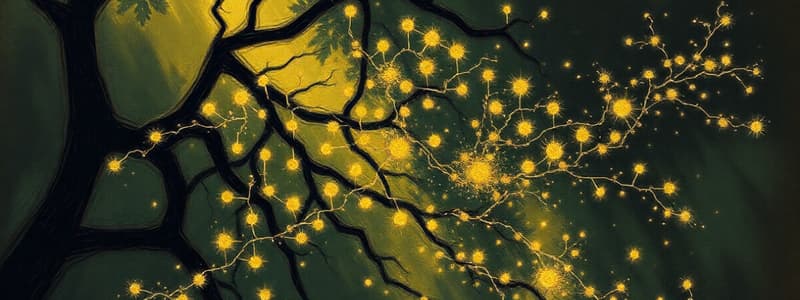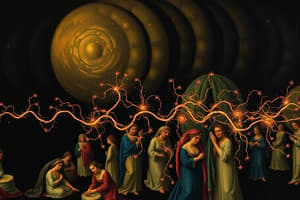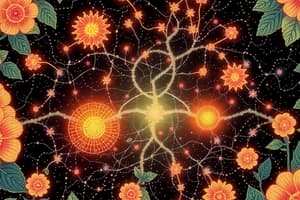Podcast
Questions and Answers
What is the primary purpose of the malate-aspartate shuttle?
What is the primary purpose of the malate-aspartate shuttle?
- To transfer electrons from the mitochondria to the cytosol
- To transport ATP from the mitochondria to the cytosol
- To regenerate NAD+ from NADH in the cytosol (correct)
- To oxidize FADH2 back to FAD
Which complex in the electron transport chain serves as the entry point for FADH2?
Which complex in the electron transport chain serves as the entry point for FADH2?
- Complex IV
- Complex I
- Complex III
- Complex II (correct)
What is the end product of the glycerol-3-phosphate shuttle?
What is the end product of the glycerol-3-phosphate shuttle?
- FADH2 (correct)
- Lactate
- NAD+
- Pyruvate
How does NADH generated in glycolysis interact with the electron transport chain?
How does NADH generated in glycolysis interact with the electron transport chain?
Which of the following statements accurately describes Complex II?
Which of the following statements accurately describes Complex II?
What molecule is ultimately reduced to form FADH2 in the Complex II reaction?
What molecule is ultimately reduced to form FADH2 in the Complex II reaction?
What is a major outcome of the glycerol-3-phosphate shuttle?
What is a major outcome of the glycerol-3-phosphate shuttle?
What role does ubiquinone play in the electron transport chain?
What role does ubiquinone play in the electron transport chain?
What is the primary role of the electron transport chain?
What is the primary role of the electron transport chain?
Which molecule acts as the final electron acceptor in the electron transport chain?
Which molecule acts as the final electron acceptor in the electron transport chain?
What is produced as a result of the oxidation of NADH in Complex I?
What is produced as a result of the oxidation of NADH in Complex I?
How do protons contribute to ATP production in the electron transport chain?
How do protons contribute to ATP production in the electron transport chain?
Which of the following statements about Complex I is true?
Which of the following statements about Complex I is true?
What characteristic of NADH contributes to its interaction with Complex I?
What characteristic of NADH contributes to its interaction with Complex I?
What effect does the proton gradient have on the pH of the mitochondrial matrix compared to the intermembrane space?
What effect does the proton gradient have on the pH of the mitochondrial matrix compared to the intermembrane space?
Which of the following processes occurs as electrons are transferred in the electron transport chain?
Which of the following processes occurs as electrons are transferred in the electron transport chain?
Which molecule is the final electron acceptor in the electron transport chain?
Which molecule is the final electron acceptor in the electron transport chain?
What happens to cyt c under anaerobic conditions?
What happens to cyt c under anaerobic conditions?
What does the reduction of one oxygen molecule yield in terms of water production?
What does the reduction of one oxygen molecule yield in terms of water production?
How many protons are pumped into the intermembrane space for each NADH molecule that enters the electron transport chain?
How many protons are pumped into the intermembrane space for each NADH molecule that enters the electron transport chain?
What is required for the full reduction of a single oxygen molecule at Complex IV?
What is required for the full reduction of a single oxygen molecule at Complex IV?
What effect does the inhibition of the citric acid cycle have on metabolic intermediates?
What effect does the inhibition of the citric acid cycle have on metabolic intermediates?
Which process does not occur when oxygen is absent in cellular respiration?
Which process does not occur when oxygen is absent in cellular respiration?
What role do proteases such as caspase play in apoptosis?
What role do proteases such as caspase play in apoptosis?
What type of protein is cytochrome c in the context of this content?
What type of protein is cytochrome c in the context of this content?
What is the primary function of Complex III in the electron transport chain?
What is the primary function of Complex III in the electron transport chain?
During the Q cycle, what happens to the original ubiquinol molecule (QH2)?
During the Q cycle, what happens to the original ubiquinol molecule (QH2)?
What does the semiquinone radical signify in the Q cycle?
What does the semiquinone radical signify in the Q cycle?
What can result from the highly reactive semiquinone produced in Complex III?
What can result from the highly reactive semiquinone produced in Complex III?
What specifically initiates the Q cycle?
What specifically initiates the Q cycle?
What is a consequence of oxidative stress in cells?
What is a consequence of oxidative stress in cells?
Why must oxygen gas cross into the hydrophobic portion of the inner mitochondrial membrane?
Why must oxygen gas cross into the hydrophobic portion of the inner mitochondrial membrane?
Flashcards
What is Electron Transport Chain?
What is Electron Transport Chain?
Electron Transport Chain (ETC) is a series of protein complexes embedded within the inner mitochondrial membrane that utilize oxidation-reduction reactions to transfer electrons and generate energy.
What starts the Electron Transport Chain?
What starts the Electron Transport Chain?
The ETC begins with the oxidation of NADH or FADH2, generated by the citric acid cycle and other metabolic pathways.
Describe the electron flow in the ETC
Describe the electron flow in the ETC
The electron transport chain is a series of oxidation-reduction reactions, where electrons are passed from one molecule to another. The final electron acceptor is molecular oxygen (O2).
How do ETC complexes create a proton gradient?
How do ETC complexes create a proton gradient?
Signup and view all the flashcards
What is the role of Complex I in the ETC?
What is the role of Complex I in the ETC?
Signup and view all the flashcards
Where are NADH and ubiquinone located in relation to Complex I?
Where are NADH and ubiquinone located in relation to Complex I?
Signup and view all the flashcards
How does Complex I contribute to proton pumping?
How does Complex I contribute to proton pumping?
Signup and view all the flashcards
What is the importance of the proton gradient created by the ETC?
What is the importance of the proton gradient created by the ETC?
Signup and view all the flashcards
Complex III Reaction
Complex III Reaction
Signup and view all the flashcards
Q Cycle
Q Cycle
Signup and view all the flashcards
Semiquinone
Semiquinone
Signup and view all the flashcards
Reactive Oxygen Species (ROS)
Reactive Oxygen Species (ROS)
Signup and view all the flashcards
Oxidative Stress
Oxidative Stress
Signup and view all the flashcards
Glycerol-3-Phosphate Shuttle
Glycerol-3-Phosphate Shuttle
Signup and view all the flashcards
Electron Transport Chain (ETC)
Electron Transport Chain (ETC)
Signup and view all the flashcards
Ubiquinol
Ubiquinol
Signup and view all the flashcards
Apoptosis
Apoptosis
Signup and view all the flashcards
Complex IV (Cytochrome c Oxidase)
Complex IV (Cytochrome c Oxidase)
Signup and view all the flashcards
Citric Acid Cycle (Krebs Cycle)
Citric Acid Cycle (Krebs Cycle)
Signup and view all the flashcards
Anaerobic Respiration
Anaerobic Respiration
Signup and view all the flashcards
Ubiquinone/Ubiquinol Ratio
Ubiquinone/Ubiquinol Ratio
Signup and view all the flashcards
Aerobic Conditions
Aerobic Conditions
Signup and view all the flashcards
Malate-Aspartate Shuttle
Malate-Aspartate Shuttle
Signup and view all the flashcards
Complex II
Complex II
Signup and view all the flashcards
Succinate Dehydrogenase
Succinate Dehydrogenase
Signup and view all the flashcards
FADH2
FADH2
Signup and view all the flashcards
Glycerol-3-Phosphate Dehydrogenase (Transmembrane Isoform)
Glycerol-3-Phosphate Dehydrogenase (Transmembrane Isoform)
Signup and view all the flashcards
Dihydroxyacetone Phosphate (DHAP)
Dihydroxyacetone Phosphate (DHAP)
Signup and view all the flashcards
Ubiquinone (Q)
Ubiquinone (Q)
Signup and view all the flashcards
Study Notes
Electron Transport Chain (ETC)
- The ETC is a series of oxidation-reduction reactions in the inner mitochondrial membrane.
- These reactions begin with the oxidation of NADH or FADH2, products of the citric acid cycle and other metabolic processes.
- Electrons from NADH and FADH2 are passed through intermediates, with oxygen (O2) as the final electron acceptor.
- Oxygen is converted to water in this process.
Complexes in the ETC
- Three complexes (Complex I, III, and IV) use energy released to pump protons from the mitochondrial matrix to the intermembrane space.
- This creates a proton gradient, with a lower proton concentration (higher pH) in the matrix and a higher concentration in the intermembrane space.
Complex I (NADH:ubiquinone oxidoreductase/NADH dehydrogenase)
- Oxidizes NADH by removing a hydride ion.
- Transfers the hydride ion to ubiquinone (coenzyme Q), converting it to ubiquinol (QH2).
- Pumps four protons (H+) from the mitochondrial matrix to the intermembrane space.
- The standard potential (E′°) for electron transfer from NADH to ubiquinone is +0.365 V.
Complex II (Succinate dehydrogenase)
- Oxidizes succinate to fumarate, reducing FAD to FADH2.
- FADH2 passes electrons to ubiquinone, converting it to ubiquinol (QH2).
- This reaction does not directly contribute to the pH gradient.
Complex III (Ubiquinone:cytochrome c oxidoreductase)
- Transfers electrons from ubiquinol (QH2) to cytochrome c (cyt c).
- Pumps four protons.
- Cytochrome c is a protein with a heme prosthetic group, in the oxidized (+3) state (cyt c ox) and the reduced (+2) state (cyt c red).
Complex IV (Cytochrome c oxidase)
- Oxygen (O2) binds to Complex IV, and four cytochrome c (cyt c) molecules pass their electrons.
- Each oxygen atom reacts with two protons, producing two water molecules.
- Four protons are pumped during the process.
Malate-Aspartate Shuttle
- Allows cytosolic NADH to generate mitochondrial NADH without using fermentation.
- Converts oxaloacetate to malate in the cytosol, which then enters the mitochondria.
- The resulting NADH in the matrix contributes to the ETC.
Glycerol-3-Phosphate Shuttle
- Another method for transferring electrons from cytosolic NADH to the mitochondrial ETC.
- Does not pump protons, resulting in less ATP production compared to the malate-aspartate shuttle.
Oxidative Stress
- Oxygen's interaction in Complex III can produce reactive oxygen species (ROS).
- ROS can damage cellular components and trigger apoptosis.
- Superoxide dismutase and catalase help mitigate oxidative stress.
Oxygen Availability
- ETC cannot function without oxygen.
- In anaerobic conditions, reduced cytochrome c builds up, and the citric acid cycle is inhibited.
Studying That Suits You
Use AI to generate personalized quizzes and flashcards to suit your learning preferences.




